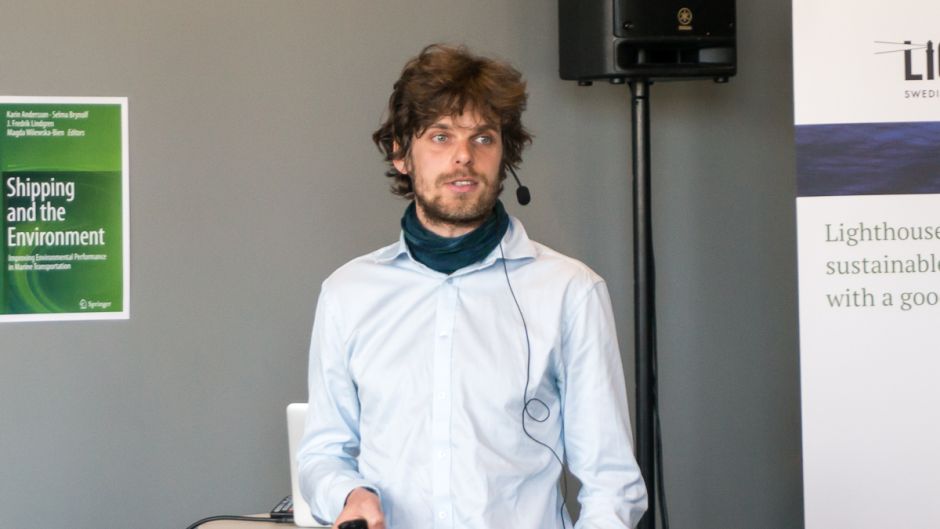How a holistic, generic model can increase energy efficiency in shipping

While much research is focused on specific components of a ship such as main engine, boilers, propeller and so on, Fabian Tillig, PhD student at Chalmers, takes a holistic and generic approach in his research on energy efficient shipping and operation.
Fabian Tillig, PhD students at Chalmers, department of Shipping and Marine Technology, was one of several interesting speakers at the Lighthouse seminar about energy efficient shipping. This is the first of a number of short summaries of the seminar.
A generic energy systems model for energy efficient ship design and operation
Fabian Tillig, PhD student, Chalmers University of Technology
- For a model to be generic we have to look at, where is the energy actually going? When we look at propulsion, the actual task of transporting cargo from point A to B, we see that energy losses occur inside and outside of the ship, Fabian Tillig says.
Tillig points out that:
• Components of the ship as an energy system are coupled and they interact with each other.
• The efficiency of most components depends on the state of operation the ship is in
• The performance of the whole system depends on the performance of each component and its interactions
• A holistic view on the system can avoid sub-optimisation
- We are trying to look at the whole ship. We have an outside, we have resistance, we have propeller, we have a lot inside, and everything depends on the outside as well. And even more, everything is coupled. Somehow we have to find a way to mathematical or empirical model these parts, in a generic way, Fabian Tillig says.
In the research a generic Aframax tanker was created and the main engine, propulsion and resistance were modelled and tested during simulations of a 3000 mile route. And as an example, by adjusting speed and power settings the model show that you should avoid high speed regions in order to keep energy consumption down.
The research will continue with validation of the model and also further examine different resistance models. And Fabian Tilligs generic model has already drawn attention from the industry.
Carnival Corporation operates more than a hundred cruise ships and is collecting data from their ships in order to build a new simulator based on the royal regal class ship. Data that researchers as Fabian Tillig can benefit from.
- We are getting data from all of our ships. Waste heat recovery, exhaust system, fuel consumptions, trim and so on. So there´s a potential for a lot of data, if you are looking for that. I’m sure we can do something, Brendan O’Keeffe, principal engineer at Carnival said during the seminar.
Fabian Tillig concluded his presentation by pointing out that at holistic or actually generic energy system model can provide feasible design targets. Which is shown by the fuel consumption simulations.
- It is not about making just the main engine more efficient or the hull or the propeller more efficient. It is important to say, we make the whole thing more efficient, Fabian Tillig says.
-
 Ny studie: Eldrivna pendelbåtar kan effektivisera Stockholms kollektivtrafik
Ny studie: Eldrivna pendelbåtar kan effektivisera Stockholms kollektivtrafik -
 Sjöfartens utsläpp ökar
Sjöfartens utsläpp ökar -
 Sociala relationer påverkar val av bränsle
Sociala relationer påverkar val av bränsle -
 Sjöfartens omställning kräver ”mjukare” påtryckningar
Sjöfartens omställning kräver ”mjukare” påtryckningar -
 Hon hade avtalad tid med Kapten ynkrygg
Hon hade avtalad tid med Kapten ynkrygg -
 Lighthouse omvärldsanalys 2025 – osäkerhet och tullar präglar sjöfarten
Lighthouse omvärldsanalys 2025 – osäkerhet och tullar präglar sjöfarten -
 Se seminariet Shipping in the Marine Environment
Se seminariet Shipping in the Marine Environment -
 Vad betyder egentligen de 90 procenten?
Vad betyder egentligen de 90 procenten? -
 Hålla där...
Hålla där... -
 Ny rapport: Klimatförändringarna ett hot mot de flesta större hamnar i världen
Ny rapport: Klimatförändringarna ett hot mot de flesta större hamnar i världen

